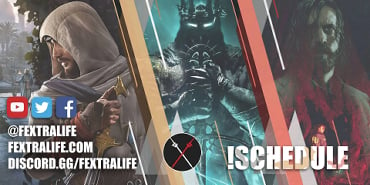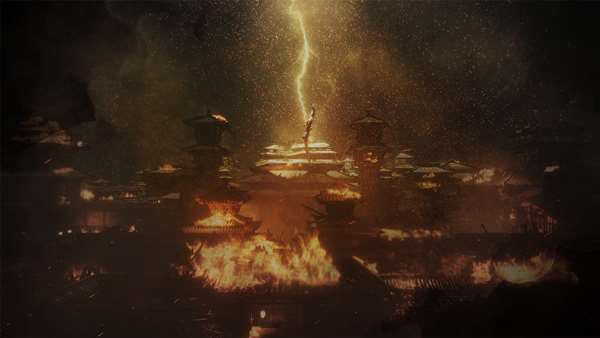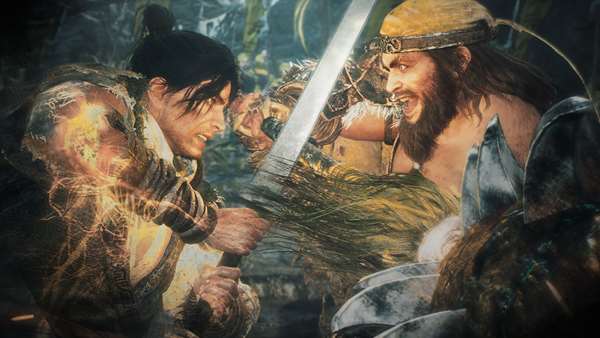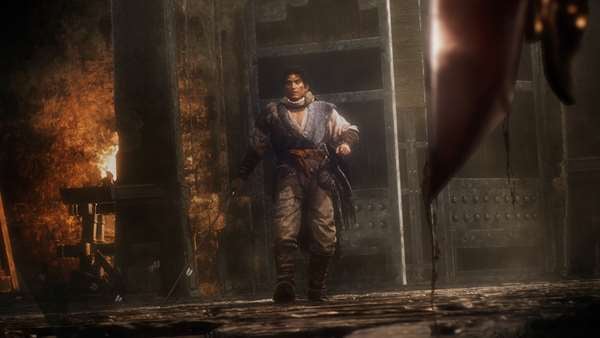Lore for Wo Long: Fallen Dynasty covers information related to the story, setting, and the world of the game. It consists of details regarding the origin of the game, symbolic locations, culture, including beings that co-exist in the mythos of Wo Long Fallen Dynasty. The game is set in China during the chaotic Three Kingdoms Era where it tells the tale of a nameless militia soldier fighting for survival in an alternate, fictional version of the Later Han Dynasty period.
Wo Long: Fallen Dynasty Lore
From the depths of darkness, a dragon soars.
The story takes place near the end of the 2nd Century, in 184 A.D. China, when the country was thrown into turmoil, bringing about the end of the long and prosperous Han Dynasty. Their fall from power is precipitated by the Yellow Turban Rebellion — a peasant uprising led by Zhang Jiao, fueled by the people's growing discontent and dwindling trust in the House of Han. Zhang Jiao's Way of the Taiping saw its dangerous rituals desecrating the land, converting blind believers and empowering them. These events take place as a growing demonic infestation is ravaging the country, which thrusts the Nameless Protagonist into action as they attempt to supress the revolters. In all the chaos, the Protagonist has a chance encounter with a young man, beginning the tale of legends in the making.
Historical Figures and Heroic Icons
On their journey to quell the thre ats in the country, the Protagonist will come across key characters who are an integral part of the Three Kingdoms saga. The majority of these are still unknown as the story focuses on the very beginning of these prominent events in China's history. Players familiar with the Dynasty Warriors titles are sure to recognize some of these key players who were building their legend during the Fall of the Han Dynasty and other scenarios revolving around these events.
Of the massive roster of characters in the Dynasty Warriors games and the Romance of the Three Kingdoms novel in general, Zhao Yun, Zhang Liang and the almighty Lu Bu have been confirmed to be in the game, with many more such as Zhou Tai and Gan Ning likely to make an appearance.
The Warring States of Ancient China
Wo Long: Fallen Dynasty will take players through the beautiful albeit war-torn landscapes of ancient China. From the snowcapped Taihang Mountains and the beseiged passageways through the Yellow River to Luoyang, the grand capital city of the Han Empire.
With the ever-looming threat of the Yellow Turban Rebellion and the growing Demonic horde, each location is fraught with peril and obstacles to overcome, as well as secrets to discover.
Records of the Three Kingdoms
The Records of the Three Kingdoms is a historical work set in China 180—280 AD. It covers the struggle for supremacy between the three states of Cao Wei, Sun Wu, and Shu Han.
The work begins in the final years of the Later Han Empire and then recounts the rise and fall of each of the states. It was compiled by Chen Shou, an official of Western Jin, the dynasty that formed after the Three Kingdoms period ended with China's unification. The Records are split into three books—the Records of Wei, Wu, and Shu—and these are
further divided into volumes that cover individuals' achievements. The work later inspired the widely beloved Romance of the Three Kingdoms, a work that blends the historical account with fictional elements from folk stories.
Elixir
Consuming this mystical drug brings about an exponential increase in the body's Qi, granting strength that exceeds normal human limits.
The highly coveted recipe requires human Qi in order to refine, and is known to only a handful of warlocks of the eternal way. To the common people, elixir is the stuff of fairy tales; only a handful of elites have ever obtained it. Its effects are diverse and range from raising the morale of an army to healing wounds. However, misuse releases an
overwhelming amount of Demonic Qi that transforms people into demons. Legends tell of several kings in ancient times—including the First Emperor of Qin—meeting tragic ends after being overcome by elixir's Demonic Qi.
The Eternal Way
The eternal way is practiced by warlocks who utilize techniques such as Qigong, meditation, and alchemy with the aim of becoming divine immortals.
Those aiming to prolong their youth and lifespan are called alchemists, and their efforts focus on methods of manipulating Qi's flow and using breathing techniques to transfer their consciousness to their Elixir Fields. Warlocks have been prominent throughout Chinese history: there are tales of some using their knowledge to gain fortune by taking
advantage of curious individuals in positions of power, and in historical records, there are mentions of men who lectured on how to gain immortality in exchange for food and lodgings, while the Feng Shan book in the Records of the Grand Historian tells of the immortals on the holy mountains of Penglai, Fangzhang, and Yingzhou where Elixir could
apparently be obtained. Xu Fu, who incited the First Emperor of Qin to drink an immortality brew, was also a warlock. Those who study the ways of Taoism are recognized as taoists.
Genuine Qi
This is the yang energy within Qi.
It is the counterpart of Demonic Qi, and is thought to be beneficial to living beings. Its awesome energy manifests as an orange light as it flows from the Elixir Field below the navel out to the Qi pathways extending throughout the body. Wielders of Genuine Qi must have either trained in the eternal way or obtained the favor of a Divine Beast. It is claimed that all of the great figures who left a mark on history were imbued with Genuine Qi. The original creators of Elixir had only intended to provide an artificial source of Genuine Qi, but the power lust of those who sought it led to it becoming a source of Demonic Qi instead.
Wizardry Spells
Called sorcery by some, wizardry spells are cast through manipulation of the body's Qi. Since ancient times these techniques were thought to be the domain of sorcerers whose primary aim was to prolong their youth and lifespan, or to gain the ability to fly. However, there are several branches to wizardry spells, including transformation, divination via feng shui, and the perception of spirits. Many of the famous generals of the Three Kingdoms period used wizardry spells to their advantage in battle, bestowing their weapons with the forces of yin—yang and the Five Phases, as well as healing injuries.
Demonic Qi
This refers to the yin energy within Qi.
It is the counterpart of Genuine Qi, and is thought to be harmful to living beings. Its awesome energy manifests as a blackened red light as it flows from the Elixir Field below the navel out to the Qi pathways extending throughout the body. Misuse of Elixir produces a surge of Demonic Qi that transforms people into demons. Demonic Qi also results from human conflict, and the larger the conflict, the more rapidly it accumulates.
Demons
A demon is a creature born from Demonic Qi.
They have red—black pupils and almost all have grotesque forms terrifying to humans.
If enveloped by Demonic Qi, a human or beast gains immense strength, but loses their sanity and becomes a demon. Users of elixir have also been known to become demons, with this coming at the cost of their self—awareness and sanity. There have been instances of people with formidable psychological strength—including certain generals—that
resisted the sanity-stripping effects of Demonic Qi and instead became half—demons. There is also a special breed of demon that results when someone blessed by a Divine Beast is consumed by Demonic Qi.
The Five Phases
Astrology and Divine Beasts
Events









